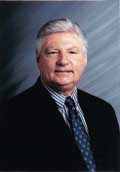


|
Alumni ProfileMaking His Case Loud and ClearAs the director of the Division of the Deaf and Hard of Hearing (DDHH) in the New Jersey Department of Human Services for nearly 20 years, Richard Herring, BS’71 (F-M), has been in a unique position to serve the needs of people who are deaf and hard of hearing. As someone who has gone through progressive hearing loss since he was a child, Herring is in an even better position to understand those needs. “I’ve had to become my own best advocate in order to learn and get ahead in life,” he says. “I’ve accepted the reality of my deafness and learned to constructively manage it.” And in the process, he has helped thousands of others. After managing very successful import/export and operating diving apparel/accessories businesses, Herring joined the DDHH in early 1981 and soon after became the division director. During his nearly two decades of serving more than 700,000 people with hearing loss in New Jersey, Herring has spearheaded numerous accomplishments, particularly in the area of communication access. |
||
|
For example, Herring helped initiate the New Jersey Relay Service in 1991. Operated by AT&T, this service relays conversations between people who use Text Telephones (TTYs) or telebraille (TB) and people who use standard telephones. A person who is deaf, hard of hearing or speech disabled types a message using a TTY (consisting of a keyboard and display screen). The message is then relayed by a communications assistant who reads it to a hearing person at the other end and then types a response. “Relay services link people who are deaf, hard of hearing or speech impaired with the hearing, speaking world,” says Herring, who was the first chair of the Board of Public Utilities’ New Jersey Relay Service Advisory Board from 1992 to 1996 and earned a citation as well as a recognition award for his stewardship. Herring has shown a willingness to make hearing loss an issue of public concern on a state level. He has advocated for public forums in which people with hearing loss can discuss their concerns, encouraged participation of people with hearing loss on major advisory boards and supported efforts to effect legislative changes that incorporate these people in advisory and other positions. He also created and directed annual statewide TTY distribution programs for the indigent and senior citizens with hearing loss, had oversight of the DDHH statewide communications access referral services and encouraged workshops on sensitivity to hearing loss. Given an expanded role of providing information to people across the state, Herring has utilized avenues such as increased e-mail usage, a Web page and Monthly Communicator, a newsletter with more than 6,500 subscribers. Herring launched and this year coordinated the DDHH’s 16th annual Deaf and Hard of Hearing Awareness Day at Six Flags Great Adventure theme park in Jackson, N.J. This event has become the largest awareness fund-raiser in the state for participating clubs and organizations of the deaf and hard of hearing. In addition, Herring is a trustee emeritus of New Jersey Deaf Awareness Week, which sponsors DEAF FEST, a cultural celebration.
Committed to sharing his knowledge, Herring has written various publications including two booklets, Notarizing by and for the Deaf and Interpreters and the Deaf Community, and developed several articles including “A Word on Hearing Loss: What’s in a Label” and “Communicating with Patients Who Have Hearing Loss.” The latter was recently published by New Jersey Medicine magazine. Herring believes the single most important issue facing people with hearing loss is breaking down communication barriers. “The communication needs of people with hearing loss should be recognized and respected.” For Herring, those needs go beyond sign language interpreting and include assistive listening devices, captioning, notetaking and other accommodations. Important strides in communication have been made, says Herring, especially since the early days of his childhood. After attending a residential school for the deaf in Manhattan for 14 years, Herring enrolled at FDU, where he earned a degree in business management and gained “all the inspiration and resources I needed to succeed.” He particularly recalls how many of his professors were very understanding of hearing loss issues and “made absolutely certain their backs never faced me as they spoke in classrooms so I could lip-read them.” |
||
|
When he’s not working as a public advocate, Herring, who resides in Lacey Township in Ocean County with his wife, Madeline, enjoys deep-sea fishing and traveling to historical places. He also collects stamps from throughout the world with a deafness theme. He now is in the process of completing his memoirs, which he is writing “to leave a personal history for my children and grandchildren and for the many people in my life who have asked, ‘How did you do it?’” In August, Herring will retire from the DDHH. He would like to return to the private sector, but wherever he goes he is determined to continue advocating for people with all degrees of hearing loss. “I will communicate with anyone any way I can to get a point across.” — A.C. |
||
|
FDU Magazine Directory | Table of Contents | FDU Home Page | Alumni Home Page | Comments |
|||